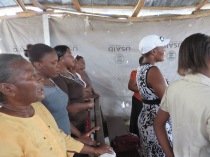Contributed by Virginia Holmstrom.
There are times when I conclude that I am surely the one Jesus referenced in Matthew 13:14: “You will indeed listen, but never understand, and you will indeed look, but never perceive.” I recently had an experience of walking in another’s shoes, and was too blind to perceive it.
I was on a five-day trip to Haiti with Bonnie Sestito [AB Women’s Ministries’ Coordinator of Mission with Women and Girls] to learn how education and micro-lending can empower the lives of women and girls and their families. American Baptist missionary Kihomi Mgwemi was our teacher, guide, and interpreter in this Haitian Creole-speaking country that also shares French, a language of Kihomi’s home country in Africa.

The Baptist women’s group at Eglise Baptiste Gabaon de Darbonne, Haiti, gathered at the church to tell their stories.
On our last afternoon, I was sitting in a destroyed and re-constructed church sanctuary in Darbonne, Haiti, near the epicenter of the January 2010 earthquake. A sheet of four-year-old tattered white tarp sporting an upside-town tagline “USAID from the American people” formed one wall of the sanctuary; a sheet of roofing sheltered us from the hot sun, and there was plenty of “open-air” access. The Baptist congregation’s women’s group had gathered to meet us and to tell us their stories of small business ventures and educational pursuits. A few women tentatively spoke in English, but Haitian Creole was the primary language. Kihomi interpreted for us the testimonies that flowed one after the other.
And then Kihomi concluded the sharing time with her remarks. She looked me in the eye, and spoke in Creole for a good two or three minutes. As I took on the posture of intent listening, my mind was musing, “Oh, dear! Kihomi has forgotten to switch languages! How long will she speak to Bonnie and me in Creole before realizing we don’t understand?” I tried to stifle a knowing smile, not wanting to interrupt her, but hardly able to contain my mirth at her unconscious error. When she finished, I was ready: My eyebrows shot up with a questioning look, I grinned at Kihomi and responded, “. . .and now in English, please?”

Kihomi Ngwemi (middle) pauses to chat and grind herbs alongside a business owner (left) who is marinating chicken to cook and sell at her street-side food stand.
Her expression did not change in the slightest degree and without missing a beat, she said in English: “I told these women that I was going to speak to you in Creole, so that you could experience what I feel when I go to your events in the United States and nothing is translated into my language.”
My mind swirled with momentary confusion before I grasped what Kihomi was attempting to illustrate. Since then, I have contemplated this moment many times, and I’ve still more layers of comprehension to wade through. It was an “earthquake moment” and there is a lot of debris I still need to sort through.
I know this: Sometimes, I am walking in the shoes of others and don’t even have the eyes to see nor the ears to hear. Perhaps you, too, have found yourself in a similar situation once upon a time.
May God open our ears, our eyes, our hearts, our minds . . . so that we might better understand what it means to walk alongside women worldwide.
Virginia Holmstrom serves as executive director of American Baptist Women’s Ministries.
Pingback: Helping Hands Change Lives | In Their Shoes: Women Walking with Women Worldwide
Thanks to your words I feel I have traveled with you. Ah, for everyone to have the lesson when speaking our mother tongue doors of understanding open.
Well done my friend. Earth shaking and reshaping indeed.